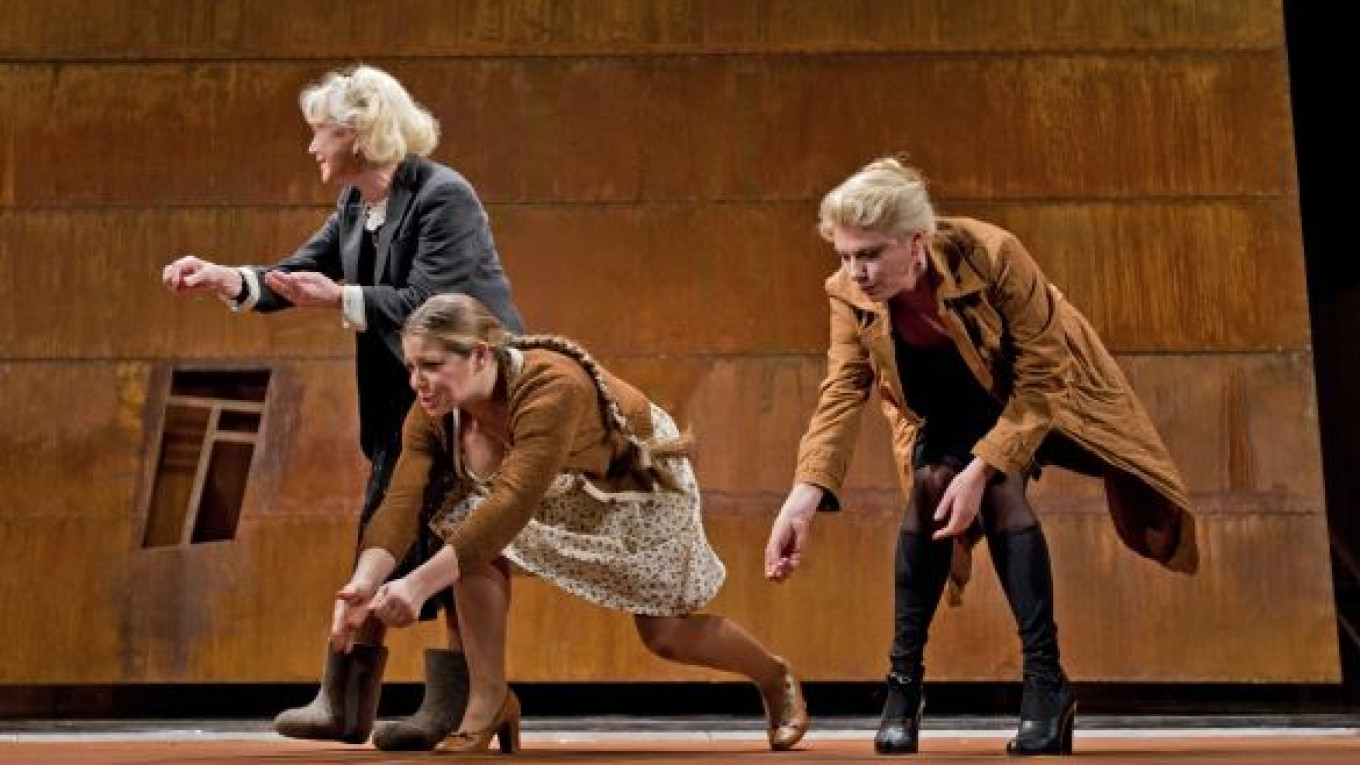In Mindaugas Karbauskis' production of Alexander Ostrovsky's "Talents and Admirers" at the Mayakovsky Theater a man who has devoted his life and love to theater often tinkles a small, high-pitched bell.
Sometimes the delicate, beautiful sound reverberates in the silent hall. At other times it is drowned out by music or talk, although that never stops him from ringing it. He does what he must no matter what transpires around him.
This is a tiny detail in Karbauskis' expansive production, but it is one of dozens that build subtly and powerfully into a show rich with heart and wisdom.
Ostrovsky, if you did not know, was a genius, and his wrenching, hilarious, "Talents and Admirers" is one of many proofs of that fact. It provides a colorful portrait gallery of key Russian archetypes. It paints a withering, knowing and loving picture of the hopes, passions, temptations and transgressions that cling like fine silk to a life in the theater. It reveals a deep, compelling knowledge of the struggle women and men endure in search of freedom and dignity.
Alexandra Negina (Irina Pegova) is a poor, gifted young provincial actress. Her beauty and talent mean she is surrounded by admirers and those who would possess her. She is headstrong and sincere, although these qualities incur trouble with local hotshots such as Count Dulebov (Igor Kostolevsky). When she refuses to become his mistress, he threatens to ruin the season-end benefit performance in her honor – the only time of the year she makes enough money to pay off her growing debts.
Always there to whisper in her ear, offer a hug, advice or a cup of tea is Negina's mother Domna Pantelevna (Svetlana Nemolyayeva). Described affectionately by Ostrovsky as a "thoroughly simple" woman, she is, of course, a powerhouse in disguise. She appreciates, even tolerates, her daughter's idealism although she knows life too well not to value money over flowers and compliments.
There to offer it all — money, flowers and compliments — is the wealthy Ivan Velikatov (Mikhail Filippov). Currently courting Negina's friend Smelskaya (Anna Ardova), he strategically moves in on Negina, paying no more attention than necessary to her boyfriend, a pedantic future schoolteacher (Daniil Spivakovsky).
The intrigues bringing these people together or breaking them apart are played out mostly on the front edge of a spinning stage in Karbauskis' production. Behind them is a cavernous space, in which designer Sergei Barkhin places a huge construction of walls that fly in and out, and may imply a theater building or a home. The walls are corroded and imposing. Spinning on the stage with the actors are a piano, chairs and, occasionally, a samovar, which ingeniously transform into a train at the proper moment.
Karbauskis, as is evident in his use of the small bell, sculpts his show's atmospheric contour with the smallest touches. Characters give the spinning stage a push with their foot — reminding us that this is a theater ruled by make-believe and that each individual ultimately answers for his or her own fate. That is surely what it means when the saddened Negina gives the stage a light push to send the devoted Petya on his way.
At nearly four hours running time, this show is a gauntlet flung at the speed-addicted modern world. Actors take their time speaking, listening, watching and reacting. Nemolyayeva's charming and deceptively whimsical Domna Pantelevna repeatedly stops to ask if someone wants a cup of tea. The show pauses to savor everything — joy, danger and pain. All, it seems to suggest, are equal elements in the human experience.
As the bell-ringing Narokov, the man who lost his fortune and heart to theater, Yefim Baikovsky turns in a magnificent performance. His sentimentality is stubborn and sincere, and it creates a rich emotional backdrop for the entire performance.
Filippov's Velikatov is magnanimous and wise. He is also ever-so-slightly tarnished; not so much because of a bad character but because he is too experienced to be otherwise. His courting of Negina's mother to get at the daughter is sublime.
Two scenes of farewell between Negina and Petya may not coax tears from stone, but I would expect them to slay most flesh-and-blood spectators.
While honoring an old tradition of theater as an unhurried, painstaking art, Karbauskis infuses this mostly modern-dress version of "Talents and Admirers" with a crisp, contemporary feel. Rhythmic in its action and speech, and subtly organized in its visual images, it brings the past and present together in one beautiful performance.
"Talents and Admirers" (Talanty i Poklonniki) plays Feb. 17 and 24 at 7 p.m. at the Mayakovsky Theater, located at 19/13 Bolshaya Nikitskaya Ulitsa. Metro Arbatskaya. Tel. 690-4658. . Running time 3 hours, 50 minutes.
A Message from The Moscow Times:
Dear readers,
We are facing unprecedented challenges. Russia's Prosecutor General's Office has designated The Moscow Times as an "undesirable" organization, criminalizing our work and putting our staff at risk of prosecution. This follows our earlier unjust labeling as a "foreign agent."
These actions are direct attempts to silence independent journalism in Russia. The authorities claim our work "discredits the decisions of the Russian leadership." We see things differently: we strive to provide accurate, unbiased reporting on Russia.
We, the journalists of The Moscow Times, refuse to be silenced. But to continue our work, we need your help.
Your support, no matter how small, makes a world of difference. If you can, please support us monthly starting from just $2. It's quick to set up, and every contribution makes a significant impact.
By supporting The Moscow Times, you're defending open, independent journalism in the face of repression. Thank you for standing with us.
Remind me later.


